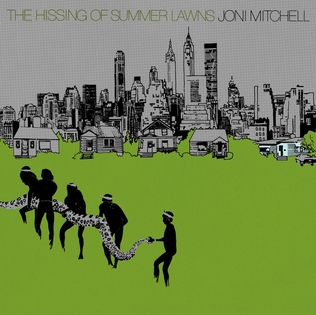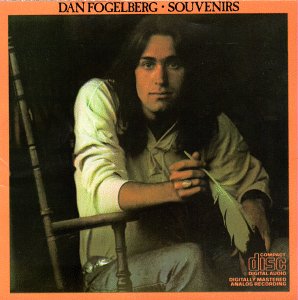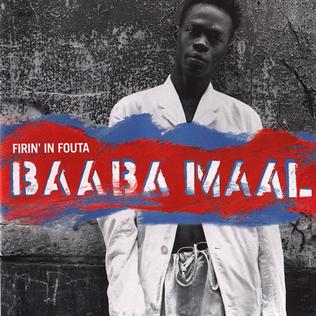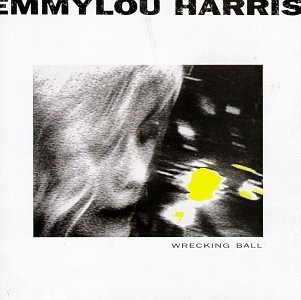
Senegal's music is best known abroad due to the popularity of mbalax, a development of conservative music from different ethnic groups and sabar drumming popularized internationally by Youssou N'Dour.

Passion is an album released in 1989 by the English singer-songwriter Peter Gabriel. It was the first Peter Gabriel album to be released on Real World Records, Gabriel's second soundtrack, and his eighth album overall.

Baaba Maal is a Senegalese singer and guitarist born in Podor, on the Senegal River. In addition to acoustic guitar, he also plays percussion. He has released several albums, both for independent and major labels. In July 2003, he was made a UNDP Youth Emissary.

Tom Petty and the Heartbreakers is the debut studio album album by the American rock band Tom Petty and the Heartbreakers, released on November 9, 1976, by Shelter Records. The album was recorded and mixed at the Shelter Studio in Hollywood, California.

Whatever is the first solo album by the American singer-songwriter Aimee Mann, released in 1993.

The Hissing of Summer Lawns is the seventh studio album by the Canadian-American singer-songwriter Joni Mitchell, released in November 1975 on Asylum Records. It continues the jazz-influenced sound of Mitchell's previous album, Court and Spark, with more unconventional and experimental material. It features sampling, synthesizers such as the Moog and ARP, and contributions from acts including the jazz-rock groups the L.A. Express and the Jazz Crusaders and James Taylor, David Crosby, and Graham Nash.

Souvenirs is the second studio solo album by the American rock singer-songwriter Dan Fogelberg. The album was released in late 1974, on the label Epic Records. The album reached No. 17 on the Billboard 200 in March 1975 and was certified double platinum by the RIAA. Joe Walsh produced the album and played on ten of the eleven tracks.

Firin' in Fouta is an album by the Senegalese singer Baaba Maal, released in 1994.

Wrecking Ball is the eighteenth studio album by American country artist Emmylou Harris, released on September 26, 1995, through Elektra Records. Moving away from her traditional acoustic sound, Harris collaborated with producer Daniel Lanois and engineer Mark Howard. The album has been noted for its atmospheric feel, and featured guest performances by Steve Earle, Larry Mullen Jr., Kate & Anna McGarrigle, Lucinda Williams and Neil Young, who wrote the title song.

Red Dirt Girl is the nineteenth studio album by American country artist Emmylou Harris, released on September 12, 2000 by Nonesuch Records. The album was a significant departure for Harris, as eleven of the twelve tracks were written or co-written by her. At the time, she was best known for covering other songwriters' work. Prior to this album, only two of Harris' LPs had more than two of her own compositions. Her next album, Stumble into Grace, was also written by Harris. The album contains "Bang the Drum Slowly", a song Guy Clark helped Harris write as an elegy for her father. The album peaked at number 3 on the Billboard country album charts and won the Grammy Award for Best Contemporary Folk Album in 2001.

fRoots was a specialist music magazine published in the UK between 1979 and 2019. It specialised in folk and world music, and featured regular compilation downloadable albums, with occasional specials. In 2006, the circulation of the magazine was 12,000 worldwide.

Sound-System is the thirtieth album by jazz pianist Herbie Hancock and the second of three albums co-produced by Bill Laswell with the ‘Rockit’ Band. Guest artists include saxophonist Wayne Shorter, guitarist Henry Kaiser, kora player/percussionist Foday Musa Suso and drummer Anton Fier.

Immigrés is an album by Senegalese singer and percussionist Youssou N'Dour. AllMusic remarks that the album is "a good part of what put [N'Dour] on the international map".

The River is a studio album by Malian singer and multi-instrumentalist Ali Farka Touré. It was recorded in sessions at Studio Bolibana in Paris, and at the London-based Cold Storage Studios and Garden Studios. The album was released by the UK-based World Circuit label and distributed internationally by Mango Records.
Mansour Seck was a Senegalese singer and musician. Best known for his collaboration with lifelong friend Baaba Maal. He has also toured and released several solo albums. He was blind.
The Senegal Music Awards (SENMA) is an annual celebration of the best of the music industry in Senegal. The event was instituted in 2008. Awards based on performances made in the previous year in 56 categories. The ceremonies include performances by some of the nominees, similar to the South African Music Awards and Grammy Awards.

5:01 Blues is the forty-sixth studio album by American recording artist Merle Haggard, with backing by The Strangers. It was released in 1989 and was his last studio album on the Epic label. It peaked at number 28 on the Billboard country albums chart. It was co-produced by Mark Yeary, keyboardist of The Strangers.

In Search of the Lost Riddim is an album by the Jamaican musician Ernest Ranglin, released in 1998. It was among the first releases from Chris Blackwell's Palm Pictures label; Blackwell's Island Records had signed Ranglin in the 1950s. The album title refers to Ranglin's decades-long absence from making music in Africa. Ranglin supported the album by playing North American shows with Baaba Maal. The album was a success on the Specialist albums chart in the United Kingdom.
















